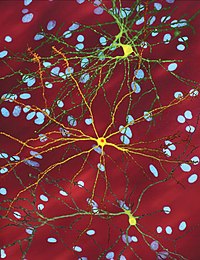
Photo from wikipedia
Environmental and physiological stresses can accelerate Alzheimer's disease (AD) pathogenesis. Under stress, a cytoplasmic membraneless structure termed a stress granule (SG) is formed and is associated with various neurodegenerative disorders,… Click to show full abstract
Environmental and physiological stresses can accelerate Alzheimer's disease (AD) pathogenesis. Under stress, a cytoplasmic membraneless structure termed a stress granule (SG) is formed and is associated with various neurodegenerative disorders, including AD. SGs contain translationally arrested mRNAs, suggesting that impaired RNA metabolism in neurons causes AD progression; however, the underlying mechanism remains unclear. Here, we identified numerous mRNAs and long non-coding RNAs that are directly targeted by the SG core proteins G3BP1 and G3BP2. They redundantly target RNAs before and after stress conditions. We further identified RNAs within SGs, wherein AD-associated gene transcripts accumulated, suggesting that SGs can directly regulate AD development. Furthermore, gene-network analysis revealed a possible link between the sequestration of RNAs by SGs and the impairment of protein neurohomeostasis in AD brains. Together, our study provides a comprehensive RNA regulatory mechanism involving SGs, which could be targeted therapeutically to slow AD progression mediated by SGs.
Journal Title: Aging
Year Published: 2023
Link to full text (if available)
Share on Social Media: Sign Up to like & get
recommendations!